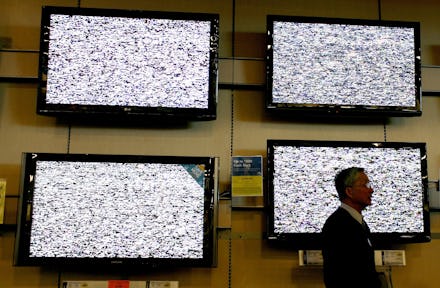The Supreme Court Just Ruled Against the Future of Television

The news: If you’re waiting for cheap Internet TV, you’re going to have to wait a bit longer.
The Supreme Court ruled against Aereo, a start-up from New York that offered access to streamed and recorded television channels for $8 a month. Aereo works through thousands of small antennas that pick up broadcast television, each "rented" to an individual user who decides what he or she wants to watch.
The decision: Aereo argued that the customer is the one making the transactions, saying, "From the beginning to the end of this process, the data stream received by an antenna is available only to the user who tuned the antenna by selecting a program to watch." Cable companies, though, accused Aereo of taking their shows and re-transmitting them for a cheaper price.
In a 6-3 decision, the Supreme Court concluded that Aereo’s model is illegal. The company does not simply provide consumers with technology, the court decided, but also unfair access to copyrighted material. Aereo argued that it resembles a copy shop — someone can make illegal copies, but the shop itself just provides the technology and shouldn’t be held liable. The court rejected that line of thinking, characterizing the business as transmitting "performances" to the public.
What it means: It's a big deal for some subscribers, but an even bigger deal for Aereo, which is kissing $97 million in investment goodbye. The bigger question is how the ruling will shape the landscape of television, currently dominated by major broadcasters.
While the Supreme Court has previously addressed issues of recording and transmitting technologies, like DVR and Betamax, the concept of the cloud (broadcasts being stored digitally for users to access) adds a new wrinkle. As SCOTUSblog noted, the most challenging part in ruling against Aereo "is for the Court to make sure that it does not write too broadly so that the result might stifle further digital-age innovation."
The Justice Department warned against stifling innovation in a brief, even though it said Aereo was "clearly infringing" on broadcasters' copyrights. "Because Aereo works by taking advantage of cloud storage, its defenders argue that clamping down on Aereo would kill the cloud computing industry," the Washington Post's Brian Fung wrote prior to the decision. "This is an important and growing part of the economy, and the Supreme Court justices seemed loath in oral arguments to rule in a way that would harm the future."
In the Court's opinion, protecting innovation is essentially left up to Congress to decide, either by improving the 1976 Copyright Act (on which this ruling was baed) or through new legislation. "We cannot now answer more precisely how the Transmit Clause or other provisions of the Copyright Act will apply to technologies not before us," the Court writes. "To the extent commercial actors or other interested entities may be concerned with the relationship between the development and use of such technologies and the Copyright Act, they are of course free to seek action from Congress."
It's true that the Court can only rule on Aereo — it's hard to avoid stifling future companies and technologies when justices don't even know what those will look like. But with investors potentially gunshy about television innovation thanks to this ruling (and all that lost Aereo money), it's understandable that tech entrepreneurs would be wary of turning to Congress for protection. Small up-and-comers don't exactly have a history of prevailing over entrenched big businesses when it comes to winning the hearts and minds of legislators.